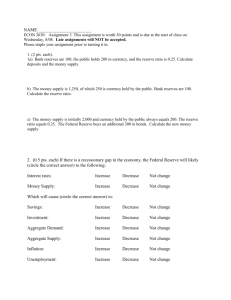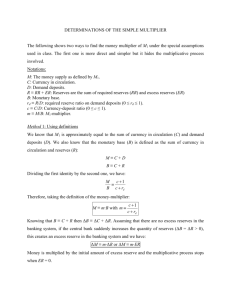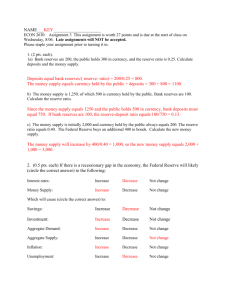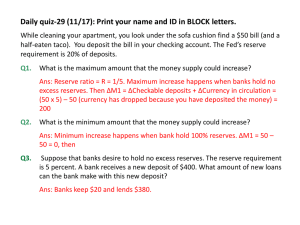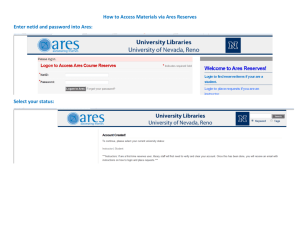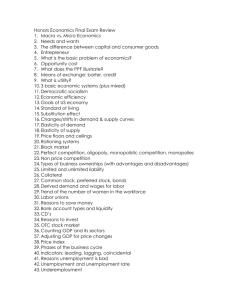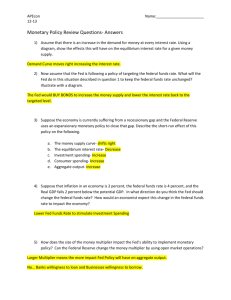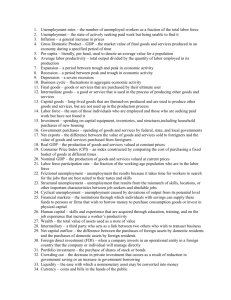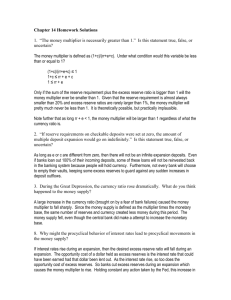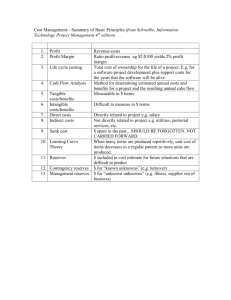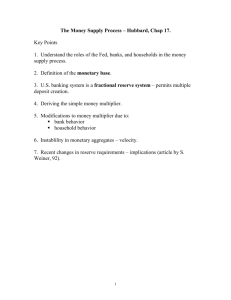SU12_2630_Assign3_Answers
advertisement
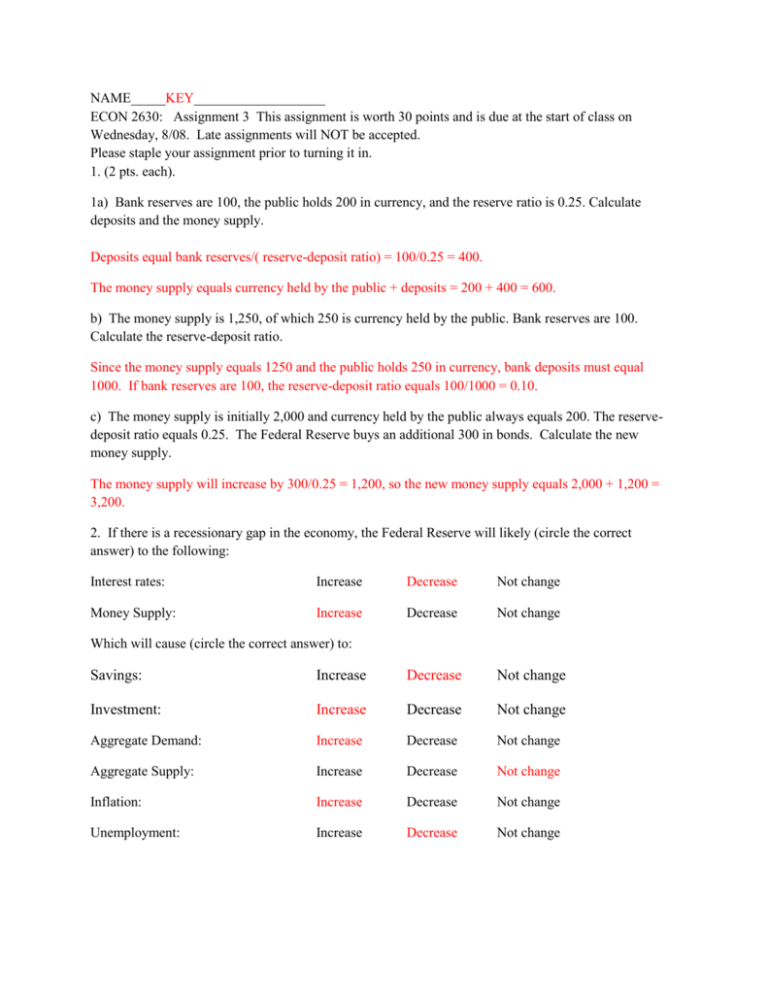
NAME_____KEY___________________ ECON 2630: Assignment 3 This assignment is worth 30 points and is due at the start of class on Wednesday, 8/08. Late assignments will NOT be accepted. Please staple your assignment prior to turning it in. 1. (2 pts. each). 1a) Bank reserves are 100, the public holds 200 in currency, and the reserve ratio is 0.25. Calculate deposits and the money supply. Deposits equal bank reserves/( reserve-deposit ratio) = 100/0.25 = 400. The money supply equals currency held by the public + deposits = 200 + 400 = 600. b) The money supply is 1,250, of which 250 is currency held by the public. Bank reserves are 100. Calculate the reserve-deposit ratio. Since the money supply equals 1250 and the public holds 250 in currency, bank deposits must equal 1000. If bank reserves are 100, the reserve-deposit ratio equals 100/1000 = 0.10. c) The money supply is initially 2,000 and currency held by the public always equals 200. The reservedeposit ratio equals 0.25. The Federal Reserve buys an additional 300 in bonds. Calculate the new money supply. The money supply will increase by 300/0.25 = 1,200, so the new money supply equals 2,000 + 1,200 = 3,200. 2. If there is a recessionary gap in the economy, the Federal Reserve will likely (circle the correct answer) to the following: Interest rates: Increase Decrease Not change Money Supply: Increase Decrease Not change Which will cause (circle the correct answer) to: Savings: Increase Decrease Not change Investment: Increase Decrease Not change Aggregate Demand: Increase Decrease Not change Aggregate Supply: Increase Decrease Not change Inflation: Increase Decrease Not change Unemployment: Increase Decrease Not change 3. Suppose the marginal propensity consume in an economy is 0.75, and banks’ reserve ratio is 0.4. Use this information to answer the following questions. a. In order to decrease interest rates by 1%, the Federal Reserve needs to increase the money supply by $2.5 billion. By how much does the Federal Reserve need to increase the money supply and bank reserves in order to decrease interest rates by 2%? The money multiplier in this economy is 2.5 (1/RR = 1/0.4), so for every $1 billion increase in bank reserves the money supply increases by $2.5 billion. To decrease interest rates by 2%, the FED needs to increase the money supply by $5 billion. To do so they need to increase bank reserves by $2 billion (change in money supply = change in reserves * money multiplier; 5 billion = 2 billion * 2.5). b. For every 1% decrease in interest rates, investment spending (which is part of ‘initial spending’ and subject to the multiplier), increases $100 billion. By how much does the Federal Reserve need to decrease interest rates in order to increase aggregate demand by $800 billion? The multiplier in this economy is 4 (1/(1-MPC) = 1/0.25), so the FED needs to increase investment spending by $200 billion to increase aggregate demand by $800 billion ($200 billion*4). In order to increase investment spending by $200 billion, they would need to decrease interest rates by 2%. c. GDP in this economy is currently $15 trillion ($15,000 billion). According to Okun’s Law, if the FED increases aggregate demand by $800 billion, what is the impact to unemployment? GDP increases by 5.3% ($800/$15,000), so according to Okun’s law, unemployment will go down by 2.65% (5.3%/2). d. Unemployment in this economy is currently 8.2%. The natural rate of unemployment is 5.55%. Given all of the information above, by how much would the FED need to increase bank reserves in order to bring unemployment down to its natural rate? The FED needs to decrease unemployment by 2.65%; in order to do that they need to increase aggregate demand by 5.3%, or $800 billion from $15 trillion; in order to do that they need decrease interest rates by 2%; in order to do that they need to increase the money supply by $5 billion; in order to do that they need to increase bank reserves by $2 billion (not coincidentally, this is the same as your answer for part a.). 4a. (1) Suppose inflation is 3% and there is an expansionary gap of 2%. According to the Taylor rule, what should the Federal Funds rate equal? 4 + 2*(0.5) + 3-2*(1.5) = 6.5 4b. (1) Suppose inflation is 0% and there is a recessionary gap of 5%. According to the Taylor rule, what should the Federal Funds rate equal? 4 - 5*(0.5) - 2-0*(1.5) = -1.5 (or 0) 4. The San Francisco Federal Reserve Bank has a “Fed Chairman Game”, where you act as the Fed Chairman and choose the Federal Funds rate depending on inflation and unemployment. The game can be found at http://www.frbsf.org/education/activities/chairman/index.html Your assignment task is simply to play the game. When you are done (your term is up), you will either be reappointed or dismissed. If you are reappointed, you will receive 8 points. If you are dismissed, you will receive 4 points. To prove that you played the game, use the screen capture (Print Screen) function on your computer (PRTSC or PRTSCN on some keyboards). Paste the image of your completed game – which will state whether you were ‘reappointed’ or ‘dismissed’ - to a blank Microsoft Word document, and staple it to your completed assignment when you turn it in. Note you can play the game as many times as you please, and you may work with others, but you have to turn in the results from your own game (the same game results cannot be printed out multiple times or copied). If it is found that you have the same exact game results (image) as someone else in the class, you both will receive a zero for the assignment. Your image should look something like this:

